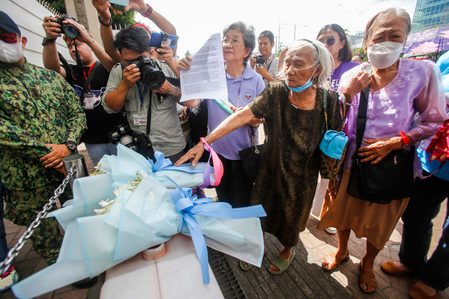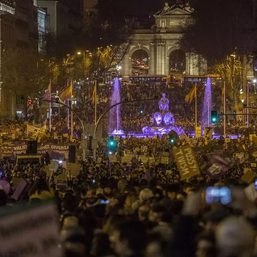SUMMARY
This is AI generated summarization, which may have errors. For context, always refer to the full article.

MANILA, Philippines – Decades after the end of World War II, Filipino comfort women continue fighting for justice. As victims of sexual abuse and torture committed by Japanese soldiers, comfort women have been lobbying for the recognition of their rights.
On March 9, the “lolas” (grandmothers) saw a semblance of hope after the United Nations Committee on the Elimination of Discrimination Against Women released a decision, saying the Philippines “violated the rights” of these comfort women. According to the UN body, the Philippines failed to provide reparation, social support, and recognition of the violations they had suffered in the hands of Japanese forces.
The body also urged the Philippines to provide the comfort women full reparation, which includes material compensation and the issuance of an official public apology.
Relevance of ‘Bahay na Pula’
In the northern part of Bulacan province stands “Bahay na Pula” (red house). True to its name, the establishment is predominantly red in color and bears similarities to other old buildings in the Philippines.
But this place is no tourist spot, nor a symbol of the country’s rich culture – Bahay na Pula is a witness to the Japanese soldiers’ sexual abuses against Filipino comfort women during World War II. At the time, the building was used by Japanese soldiers as barracks.
On November 23, 1944, Mapanique in Pampanga province was attacked by mortar – with the Imperial Japanese Army dousing houses in the area with gasoline and killing men using bayonets. Some of the women in the area and nearby places were held in Bahay na Pula, which, according to the Inquirer, was owned by the Ilusorios.
Based on the accounts, the women were repeatedly tortured and raped, and used as sex slaves. A lot of the survivors left their homes for fear of being stigmatized and persecuted. A Rappler opinion piece even noted that some of the survivors were traumatized “by male companionship that they refused to marry and have children.”
The survivors also “spent their lives in misery, having endured physical injuries, pain and disability, and mental and emotional suffering,” according to their 2010 petition before the Supreme Court.
Some of the Filipino comfort women formed and joined organizations like Malaya Lolas Organization and Lila Pilipina.
Supreme Court battle
In 2010, the Malaya Lolas led by Isabelita Vinuya filed a petition for certiorari, with an application of a writ of preliminary mandatory injunction before the Supreme Court (SC) against the Office of the Executive Secretary, Department of Justice (DOJ), Department of Foreign Affairs (DFA), and the Office of the Solicitor General (OSG).
According to the lolas, they have been approaching the executive secretary, DOJ, DFA, and the OSG since 1998 to request for assistance in filing a claim “against the Japanese officials and military officers who ordered the establishment of the ‘comfort women’ stations in the Philippines.”
The executive department at the time declined to help the comfort women because they held that the individual claims of the victims had already been satisfied with the peace treaty between the Philippines and Japan.
The petition asked the High Court to declare that the government agencies mentioned committed grave abuse of discretion amounting to lack or excess of discretion after they refused to help the lolas. It also asked the SC to compel the government agency-respondents to support their fight for reparations before international tribunals like the International Court for Justice.
In arguing against the government before the High Court, the lolas said that the general waiver of claims done by the Philippine government with its Treaty of Peace with Japan was void. They said the comfort women system established by Japanese soldiers and the victims’ brutal rape and enslavement constituted crimes against humanity, sexual slavery, and torture.

The Philippine government, in its argument, said all claims of the country and its citizens in relation to the war with Japan had already been settled in the San Francisco Peace Treaty of 1951 and the bilateral Reparations Agreement of 1956. The San Francisco agreement is a treaty that waives reparation claims.
The SC sided with the state and dismissed the petition for lack of merit. The High Court also upheld the prerogative powers of the executive, saying it “has the exclusive prerogative to determine whether to espouse petitioners’ claims against Japan.”
2019 petition
Nine years after their loss at the High Court and after having exhausted all local channels, the Filipino comfort women sued the Philippine government at the United Nations. The lolas sent a communication to the UN committee on women and asked the body to urge the Philippines to “provide full and effective redress and reparation, including compensation, satisfaction, official apologies and rehabilitative services.”
This became the basis of the UN body’s decision released recently.
In the communication, the lolas accused the state of violating its obligations under the Convention on the Elimination of all forms of Discrimination Against Women (CEDAW). Aside from this, the comfort women also sought to compel the Philippine government to “adequately integrate the issue of ‘comfort women’ in textbooks and ensure that historical facts are objectively presented to students and the public at large.”
The Center for International Law (CenterLaw) assisted the lolas in their petition filed before the UN. According to the group, the comfort women invoked an optional protocol in the CEDAW – which established mechanisms for complaint and inquiry into alleged violations against women.
As part of the treaty, the Philippines has agreed to “give due consideration to the views of the Committee,” and has been mandated to inform the body of its actions taken in women rights-related cases concerning the country.
After the UN body released its latest decision, CenterLaw said the victory came at a “long road” because some of the comfort women like Vinuya and Belen Culala had already passed away. The group added the UN victory is not the end yet, and urged the Philippine government to ensure full protection and uphold the rights of comfort women.
Current admin’s position
In a statement on Friday night, the Presidential Communications Office (PCO) said it noted the decision of the UN body on the petition filed by the comfort women. The PCO added the Philippine government “recognizes” the suffering of the victims but claimed reparations were already made.
It added it would also submit a written response to the UN body.
The PCO’s statement was different from Justice Secretary Jesus Crispin “Boying” Remulla’s position on the matter. He said a law was needed to act on the Filipino comfort women’s claims, adding that he would urge Congress to enact the necessary legislation.
Remulla also said that responding to the victims’ claims against Japan was part of the Philippines’ commitment to the international community. They “never want justice to be too late,” he said, because some of the comfort women have already died.
This position is also different from the position taken by the previous administrations. When reporters asked Remulla why the Marcos administration seemed to be taking a different stance on the issue, all he said was he would “study” the matter. – Rappler.com
Add a comment
How does this make you feel?
![[OPINION] Honoring the predecessors of the #HijaAko movement](https://www.rappler.com/tachyon/2020/07/HerStory-Lives-640.jpg?fit=449%2C360)

![[OPINION] Power of mimicry: How human rights are covertly undermined in PH](https://www.rappler.com/tachyon/2024/06/duterte-marcos-human-rights.jpg?resize=257%2C257&crop_strategy=attention)




![[OPINION] Why women seek divorce](https://www.rappler.com/tachyon/2024/06/TL-women-seeking-divorce-june-14-2024.jpg?resize=257%2C257&crop_strategy=attention)
![[Pastilan] When ‘till death do us part’ sounds like a threat](https://www.rappler.com/tachyon/2024/06/TL-woman-divorce-abuse-june-11-2024.jpg?resize=257%2C257&crop_strategy=attention)



There are no comments yet. Add your comment to start the conversation.